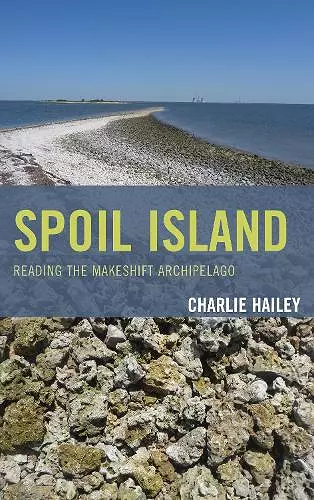Spoil Island
Reading the Makeshift Archipelago
Format:Hardback
Publisher:Lexington Books
Published:1st Aug '13
Currently unavailable, and unfortunately no date known when it will be back

Is there an allure of spoiled places? Spoil islands are overlooked places that combine dirt with paradise, waste-land with “brave new world,” and wildness with human intervention. Although they are mundane products of dredging, these islands form an uninvestigated archipelago that demonstrates the potential value and contested re-valuation of landscapes of waste. To explore these islands, Spoil Island: Reading the Makeshift Archipelago navigates a course along the U.S. east coast, moving from New York City to Florida. Along the way, a general populace squats, picnics, and reflects on the islands, while other forces are also at work. New York City parks commissioner Robert Moses first deplores then adopts Hoffman and Swinburne Islands, UN Secretary General U Thant meditates on the East River’s Belmont Island, businessman John D. MacArthur rejects the purchase of Peanut Island, artist Christo surrounds Miami’s spoil islands, Key Westers debate the futures of two spoil islands that mark their sunset view, and artist Robert Smithson augments this archipelago materially and conceptually. Historical and contemporary stories highlight each island’s often contradictory ecologies that pair nature with infrastructure, public concerns with private development, rationalized urbanism with artistic impulse, and order with disorder. Spoil islands put you in places you normally wouldn’t—and perhaps shouldn’t—be. To examine these marginalized topographies is to understand emergent concerns of twenty-first-century place-making, public space, and natural and artificial infrastructure. Today, spoil islands constitute an unprecedented public commons, where human agency and nature are inextricably linked. Spoil Island will be of interest to anyone working in the areas of architecture, cultural history, cultural geography, environmental studies, or environmental philosophy. Linking the islands with their environmental aesthetics, Charlie Hailey provides a lively and critical topography of places that play a part in current events and local situations with global implications.
Hailey (architecture, U. of Florida) looks at islands created by soil and rock from dredged channels, ports, and cuts along the east coast of the US. His main interest is how the islands came about and how people have used them, though he also discusses wildlife and plants. He covers building New York Harbor's islands of waste, rip-rap, U Thant's East River island, mound, the common wilderness of Indian River's linear archipelago, nettle, Peanut Island's mutinous landscapes camp, development Biscayne Bay's lagoon, spit, surrounding Biscayne Bay's spoil islands, sand, Key West's western margin, and barge. * Book News, Inc. *
It’s exciting to see a book on the array of intentionally incidental landmasses that line our channels and dot our harbors. Focusing mainly on Florida—that most constructed and tenuous state—Charlie Hailey’s detailed histories of a few selected sites assert that the things we make without much thought give us a lot to think about. -- Matt Coolidge, Center for Land Use Interpretation
Spoil Island is almost magical, as is the place of which it speaks—‘surreal, free, and maddeningly difficult, spoil islands offer a range of experiences like nowhere else.’ To say that this a compelling tale of a landscape undergoing the transition from industrial channel dredging to recreational uses or a striking illustration of self-organization in the complex dance of linked human-natural events would only hint at its accomplishments. In this work, Charlie Hailey not only continues his imaginative presentations of interesting places, but without exaggeration enters the company of Ivan Doig and Barry Lopez. The wonderful writing weaves together vivid first-hand experiences, historical narrative, and biographical threads, from which emerge a site in the Gulf of Mexico that, as Melville says, ‘is not drawn on any map, true places never are. -- Robert Mugerauer, University of Washington
Spoil Island serves as a clear contribution to the study of religion and ecology, questioning the ontology of natural ecosystems among other things; it makes contributions to aesthetics, through the various excursions made into art forms; finally it has a lot to say on sacred place and journey. -- Kip Redick, Christopher Newport University
ISBN: 9780739173060
Dimensions: 235mm x 160mm x 32mm
Weight: 644g
336 pages